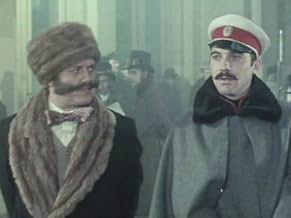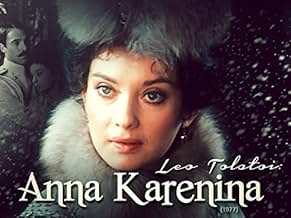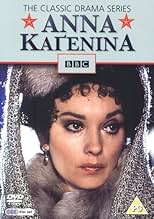Füge eine Handlung in deiner Sprache hinzuAnna Karenina is the young wife of an older husband. She has an affair with the handsome Count Vronsky. By following her desires, Anna complicates her life.Anna Karenina is the young wife of an older husband. She has an affair with the handsome Count Vronsky. By following her desires, Anna complicates her life.Anna Karenina is the young wife of an older husband. She has an affair with the handsome Count Vronsky. By following her desires, Anna complicates her life.
- Für 2 Primetime Emmys nominiert
- 5 Nominierungen insgesamt
Folgen durchsuchen
Empfohlene Bewertungen
This version of 'Anna Karenina' by Tolstoy presents the story in ten parts of around 50 minutes each. Starring Nicola Pagett, best known as Elizabeth Bellamy in 'Upstairs, Downstairs', as Anna; with Stuart Wilson as Vronsky and Eric Porter as Karenin.
This is a leisurely version, with time to develop the minor characters and subplots, while keeping true to the book in the story of Anna's affair with Count Vronsky, and its tragic conclusion. It starts with the infidelity of her brother and in doing so, shows the difference between men and women where divorce and adultery are concerned.
As Anna, Pagett is excellent, veering from thoughtless frivolity to total despair; while Eric Porter is perfect as Karenin, strong, tormented, and complicated. Stuart Wilson is charming as Vronsky, looks the part and is an appealing character. In support the rest of the cast are excellent too, especially Sheila Gish as Betsy and Mary Morris as Countess Vronsky.
This mini series is well worth your time and doesn't have a dated feel at all - the space given to the story means this version has more weight than those with Garbo or Vivien Leigh.
This is a leisurely version, with time to develop the minor characters and subplots, while keeping true to the book in the story of Anna's affair with Count Vronsky, and its tragic conclusion. It starts with the infidelity of her brother and in doing so, shows the difference between men and women where divorce and adultery are concerned.
As Anna, Pagett is excellent, veering from thoughtless frivolity to total despair; while Eric Porter is perfect as Karenin, strong, tormented, and complicated. Stuart Wilson is charming as Vronsky, looks the part and is an appealing character. In support the rest of the cast are excellent too, especially Sheila Gish as Betsy and Mary Morris as Countess Vronsky.
This mini series is well worth your time and doesn't have a dated feel at all - the space given to the story means this version has more weight than those with Garbo or Vivien Leigh.
I remember seeing this version of "Anna Karenina" on PBS when it was re- broadcast in the late 1980s. I actually taped the entire series on Beta video tape, but haven't checked at all recently to see if the tapes are still viable. I was deeply impressed with the production values of "Anna,' including the choice of filming locations, acting, costumes, and use of music. (I particularly remember the use of a lot of Tchaikovsky.)
I've always wondered why this magnificent production hasn't been re-issued on video or DVD. I for one would buy it in a heartbeat. Short of that, I should get my Betamax repaired and transfer the tapes to VHS, DVD, or VCD for my own use.
10/10
I've always wondered why this magnificent production hasn't been re-issued on video or DVD. I for one would buy it in a heartbeat. Short of that, I should get my Betamax repaired and transfer the tapes to VHS, DVD, or VCD for my own use.
10/10
Both of the leads, Nicola Paget and Stuart
Wilson, are nearly perfect in their roles. Wilson especially is a fully developed character and one a woman might fling away her life for. Nicola Paget is beautiful, high strung, and portrays Anna as a woman on the edge...more or less forced into an early marriage with a stuffy, pompous and very dull statesman. Only the love for her young son prevents her from divorcing at any cost. Meanwhile the love of her life Vronsky suffers for her as she drives herself to distraction. Wilson is really excellent as Vronsky and I also loved him as Fernando Lopez in The Pallisers. He is an underrated dramatic actor. The supporting characters are mostly well-cast and well-acted. I have watched many versions of this story and this version ranks at the top for me.
After recently reading and falling in love with the book, I started doing research into the filmed adaptations of the novel. I first watched the BBC adaptation from 2000, which impressed me, but I was somewhat disappointed by the amount of editing done to the story.
I, therefore, picked up this version with great anticipation, because it is much longer (10 hours) and I was hoping would therefore be a more fully realized version of the story.
Unfortunately, I barely made it through the first hour before turning it off and giving up on it.
The whole production felt too staged and unnatural for my taste. The actors looked like English 'thespians' dressed up in stock period costumes rather than Russian aristocrats. And they all more or less spoke in the same loud and clear stage voice making the conversations feel less intimate than I would have liked.
Camera-work and directing was mostly just like that of a noontime soap opera.
I'm sure that in 1977 this was perfectly acceptable, but nowadays, it is just not good enough to spend time watching. It certainly does no justice to what is often considered one of the greatest novels ever written.
If you are looking for a filmed adaptation of this story, stick with the more recent version from 2000. While it is a somewhat edited down version of the story, it is a much superior product that does a far better job of fully capturing the richness of Tolstoy's novel.
I, therefore, picked up this version with great anticipation, because it is much longer (10 hours) and I was hoping would therefore be a more fully realized version of the story.
Unfortunately, I barely made it through the first hour before turning it off and giving up on it.
The whole production felt too staged and unnatural for my taste. The actors looked like English 'thespians' dressed up in stock period costumes rather than Russian aristocrats. And they all more or less spoke in the same loud and clear stage voice making the conversations feel less intimate than I would have liked.
Camera-work and directing was mostly just like that of a noontime soap opera.
I'm sure that in 1977 this was perfectly acceptable, but nowadays, it is just not good enough to spend time watching. It certainly does no justice to what is often considered one of the greatest novels ever written.
If you are looking for a filmed adaptation of this story, stick with the more recent version from 2000. While it is a somewhat edited down version of the story, it is a much superior product that does a far better job of fully capturing the richness of Tolstoy's novel.
I have to admit that I saw this series only once (in 1978), and my memory of it has faded somewhat. Nevertheless, I still vividly recall its vibrant reproduction of Tolstoy's masterpiece, its authentic characterizations, and its remarkable set pieces, especially given the fact that this was a television production.
Standouts include Nicola Pagett's complicated portrayal of Anna, and Robert Swann as the ambivalent Levin. The intoxicating scene of Levin and his peasants bringing in the harvest, and Anna's tragic demise are worth viewing again.
Hope the powers that be resurrect this one in the near future!
Standouts include Nicola Pagett's complicated portrayal of Anna, and Robert Swann as the ambivalent Levin. The intoxicating scene of Levin and his peasants bringing in the harvest, and Anna's tragic demise are worth viewing again.
Hope the powers that be resurrect this one in the near future!
Wusstest du schon
- WissenswertesAnna Karenina is a novel by the Russian author Lev Tolstoy, first published in book form in 1878. Considered to be one of the greatest works of literature ever written, Tolstoy himself called it his first true novel. It was initially released in serial installments from 1875 to 1877, all but the last part appearing in the periodical The Russian Messenger. When William Faulkner was asked to list what he thought were the three greatest novels, he replied: "Anna Karenina, Anna Karenina, and Anna Karenina."
- VerbindungenFeatured in The 30th Annual Primetime Emmy Awards (1978)
Top-Auswahl
Melde dich zum Bewerten an und greife auf die Watchlist für personalisierte Empfehlungen zu.
- How many seasons does Anna Karenina have?Powered by Alexa
Details
- Erscheinungsdatum
- Herkunftsland
- Offizieller Standort
- Sprache
- Auch bekannt als
- Ana Karenina
- Drehorte
- Produktionsfirma
- Weitere beteiligte Unternehmen bei IMDbPro anzeigen
Zu dieser Seite beitragen
Bearbeitung vorschlagen oder fehlenden Inhalt hinzufügen































